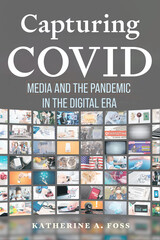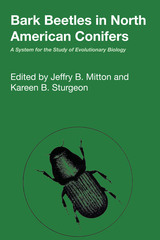
Because they prey upon a wide variety of conifers, bark beetles have a major impact upon western forests. In most of the western states, for example, we have witnessed bark beetles in epidemic outbreaks, attacking and damaging ponderosa pine, limber pine, and other hosts.
The ecosystem of bark beetle and host tree is a highly coevolved community of organisms in which the evolution of one member of the community significantly influences the evolution of the other. Largely because of the enormous economic impact these insects exert on the management of our forests, few other such communities have been studied so extensively. Bark Beetles in North American Conifers brings together in one volume both theory and a wealth of empirical data gathered by researchers from all the fields in which bark beetles are studied: ecology, evolutionary biology, population genetics, entomology, and forestry.
Topics covered include the life cycle of bark beetles and their population dynamics, their genetic variation and evolutionary mechanisms, the evolution and systematics of the major groups of bark beetles, pheromone production and its implications for coevolution among these organisms, the interaction between bark beetles and their predators, host resistance and susceptibility, the relationship of parasites and symbiotic micro-organisms in general, and management and control of bark beetles based on sound ecological and evolutionary concepts. The concluding section of the book summarizes the dynamics of the coevolved system of bark beetle and host tree and discusses controversial issues for which this system may provide important answers.

Microorganisms, such as bacteria, are important determinants of health at the individual, ecosystem, and global levels. And yet many aspects of modern life, from the overuse of antibiotics to chemical spills and climate change, can have devastating, lasting impacts on the communities formed by microorganisms. Drawing on the latest scientific research and real-life examples such as attempts to reengineer these communities through microbial transplantation, the construction of synthetic communities of microorganisms, and the use of probiotics, this book explores how and why communities of microorganisms respond to disturbance, and what might lead to failure. It also unpacks related and interwoven philosophical questions: What is an organism? Can a community evolve by natural selection? How can we make sense of function and purpose in the natural world? How should we think about regeneration as a phenomenon that occurs at multiple biological scales? Provocative and nuanced, this primer offers an accessible conceptual and theoretical understanding of regeneration and evolution at the community level that will be essential across disciplines including philosophy of biology, conservation biology, microbiomics, medicine, evolutionary biology, and ecology.
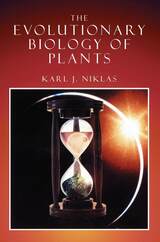
After presenting key evolutionary principles, Niklas recounts the saga of plant life from its origins to the radiation of the flowering plants. To investigate how living plants might have evolved, Niklas conducts a series of computer-generated "walks" on fitness "landscapes," arriving at hypothetical forms of plant life strikingly similar to those of today and the distant past. He concludes with an extended consideration of molecular biology and paleontology. An excellent overview for undergraduates, this book will also challenge graduate students and researchers.

In science, more than elsewhere, a word is expected to mean what it says, nothing more, nothing less. But scientific discourse is neither different nor separable from ordinary language—meanings are multiple, ambiguities ubiquitous. Keywords in Evolutionary Biology grapples with this problem in a field especially prone to the confusion engendered by semantic imprecision.
Written by historians, philosophers, and biologists—including, among others, Stephen Jay Gould, Diane Paul, John Beatty, Robert Richards, Richard Lewontin, David Sloan Wilson, Peter Bowler, and Richard Dawkins—these essays identify and explicate those terms in evolutionary biology which, though commonly used, are plagues by multiple concurrent and historically varying meanings. By clarifying these terms in their many guises, the editors Evelyn Fox Keller and Elisabeth Lloyd hope to focus attention on major scholarly problems in the field—problems sometimes obscured, sometimes reveals, and sometimes even created by the use of such equivocal words. “Competition,” “adaptation,” and “fitness,” for instance, are among the terms whose multiple meaning have led to more than merely semantic debates in evolutionary biology.
Exploring the complexity of keywords and clarifying their role in prominent issues in the field, this book will prove invaluable to scientists and philosophers trying to come to terms with evolutionary theory; it will also serve as a useful guide to future research into the way in which scientific language works.

"Intriguing and insightful."—William Kimler, American Scientist
"[A] volume of impressive scholarship and extensive references."—Library Journal
"One of Bowler's best."—Kevin Padian, Nature
"[Bowler's] comprehensive review of the various debates and ideas in taxonomy, morphology, and vertebrate evolution . . . deserves the attention of biologists and other scholars interested in the history of ideas."—Choice
"The persistence of pre-Darwinian modes of thought in contemporary biology underlines the importance of Bowler's book. Its value is not only in the history it provides, but also in the way it illumines the present."—Peter J. Causton, Boston Book Review
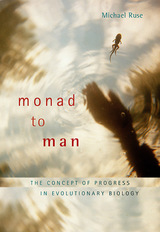
The idea of evolution: it fascinates some of us, disturbs others, and leaves only a very few people indifferent. In a major new interpretation of evolutionary theory, Michael Ruse pinpoints the common source of this attraction and discomfort. A renowned writer on evolutionary theory and its history, Ruse has long been sensitive to the fact that many people--and not simply religious enthusiasts--find something deeply troubling about much of what passes for science in evolutionary circles. What causes this tension, he finds in his search of evolutionism's 250-year history, is the intimate relationship between evolution and the secular ideology of progress.
Ubiquitous in Darwin's time, the idea of an unceasing improvement in life insinuated its way into evolutionary theory from the first. In interviews with today's major figures in evolutionary biology--including Stephen Jay Gould, Edward O. Wilson, Ernst Mayr, and John Maynard Smith--and in an intimate look at the discoveries and advances in the history and philosophy of science, Ruse finds this belief just as prevalent today--however it might be denied or obscured. His book traces the delicate line between those who argue that science is and must be objective and those who deem science a "social construction" in the fashion of religion or the rest of culture. It offers an unparalleled account of evolutionary theory, from popular books to museums to the most complex theorizing, at a time when its status as science is under greater scrutiny than ever before.
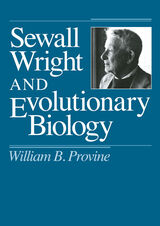
"In Sewall Wright and Evolutionary Biology . . . Provine has produced an intellectual biography which serves to chart in considerable detail both the life and work of one man and the history of evolutionary theory in the middle half of this century. Provine is admirably suited to his task. . . . The resulting book is clearly a labour of love which will be of great interest to those who have a mature interest in the history of evolutionary theory."-John Durant, ;ITimes Higher Education Supplement;X

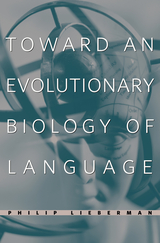
In this forcefully argued book, the leading evolutionary theorist of language draws on evidence from evolutionary biology, genetics, physical anthropology, anatomy, and neuroscience, to provide a framework for studying the evolution of human language and cognition.
Philip Lieberman argues forcibly that the widely influential theories of language's development, advanced by Chomskian linguists and cognitive scientists, especially those that postulate a single dedicated language "module," "organ," or "instinct," are inconsistent with principles and findings of evolutionary biology and neuroscience. He argues that the human neural system in its totality is the basis for the human language ability, for it requires the coordination of neural circuits that regulate motor control with memory and higher cognitive functions. Pointing out that articulate speech is a remarkably efficient means of conveying information, Lieberman also highlights the adaptive significance of the human tongue.
Fully human language involves the species-specific anatomy of speech, together with the neural capacity for thought and movement. In Lieberman's iconoclastic Darwinian view, the human language ability is the confluence of a succession of separate evolutionary developments, jury-rigged by natural selection to work together for an evolutionarily unique ability.
READERS
Browse our collection.
PUBLISHERS
See BiblioVault's publisher services.
STUDENT SERVICES
Files for college accessibility offices.
UChicago Accessibility Resources
home | accessibility | search | about | contact us
BiblioVault ® 2001 - 2025
The University of Chicago Press



